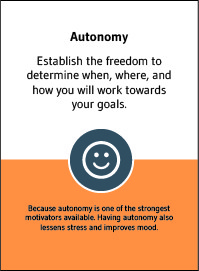The Science of Autonomy at Work
 Autonomy at Work: A Story
Autonomy at Work: A Story
Kim assigned a crucial project to Juan, and really wanted it to go well. So she asked him to prepare 24 milestones along the way, starting with an extremely detailed concept approval document. She scheduled a two hour meeting to review the concept approval, and was asking about–and then changing–many details, from coding standards to compiler settings. Juan became less engaged throughout the process, and finally mustered up the courage for have a courageous conversation with Kim. Then he expressed that he didn’t feel ownership of the project, and that her management style was making him much less enthusiastic about the project.
Kim listened carefully, considered Juan’s input, and realized she had been making a mistake. She cut the number of milestones in half, cut review meeting duration in half, and expressed her confidence and trust in Juan. As a result, his engagement bloomed.
The Science
A large set of studies suggest that autonomy is a key human motivator. This certainly includes autonomy at work. In workshops, I regularly ask people to stand up if they enjoy being micro-managed, and nobody does. Clearly, we don’t enjoy being micro-managed. So, why do it to others?
We need autonomy at work. Needs are motivators. The data is clear: if you want an engaged, motivated colleague, give them clear goals, limited feedback when necessary, and otherwise stay out of their way except to celebrate progress.
Learn More
This study is a great place to start: Self-determination theory and the facilitation of intrinsic motivation, social development, and well-being. Ryan, Richard M.; Deci, Edward L. American Psychologist, Vol 55(1), Jan 2000, 68-78.
Apply It
Manage objectives, not every little detail. If you trust your people do be engaged and do their best work, they will deliver great results. Please let us know how it goes, because doing so will help others!
(Note that this is part of a series of blog posts focused on solutions offered in Choose Happiness @ Work.)